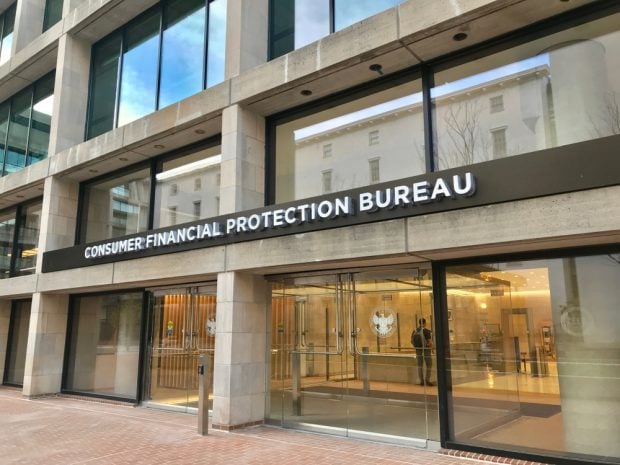 CFPB headquarters in Washington, D.C. (Source: Shutterstock)
CFPB headquarters in Washington, D.C. (Source: Shutterstock)
NAFCU and CUNA filed letters Monday opposing the CFPB's proposed rule that would prevent most foreclosures from starting before year's end.
The CFPB announced the proposal April 5 as part of a plan to make sure the millions of Americans who are behind on their mortgages because of the COVID-19 pandemic have enough time to catch up or reach agreements with their borrowers.
Recommended For You
Monday was the deadline for comments, and the CFPB plans to implement some form of the rule by Aug. 31. It includes a provision to require most delinquencies to undergo a pre-foreclosure review period that ends no sooner than Dec. 31 "to make sure borrowers aren't rushed into foreclosure when a potentially unprecedented number of borrowers exit forbearance at around the same time this fall," the CFPB said in its April 5 news release.
The rule only applies to mortgages on primary residences and only on institutions with more than 5,000 mortgages. Credit unions with more than 5,000 first and second-lien mortgages accounted for $1 trillion of the movement's $1.86 trillion in assets as of Dec. 31, and just over half of its 125.7 million members.
Kaley Schafer, NAFCU's senior regulatory affairs counsel, wrote in a five-page letter that the group generally opposes the pre-foreclosure review period, saying current rules suffice to ensure borrowers have adequate time to reach an agreement with their lenders. If it is adopted, NAFCU asked the bureau to provide exceptions that would allow some foreclosures to begin before Dec. 31.
"Allowing for exemptions from the pre-foreclosure review period so a servicer may file the first notice or filing will ease servicer capacity issues, as loss mitigation applications may come in waves," Schafer wrote.
"NAFCU encourages the bureau to provide flexibility, where possible, in terms of documents that a credit union can provide to a member without triggering the first notice or filing. In certain circumstances, the documents associated with the first notice or filing can prompt communication between the member and credit union where a member was previously non-responsive to communications."
CUNA's opposition was stronger, saying that the proposed extension of the foreclosure moratorium exceeds CFPB's authority. Elizabeth LaBerge, CUNA's senior director of advocacy and counsel, wrote a 19-page letter outlining its objections.
"CUNA urges the bureau, in the strongest terms, to not finalize its provision establishing a foreclosure moratorium as doing so is unnecessary, the bureau does not have the authority to promulgate the change, and the provision is likely unconstitutional," LaBerge wrote. "The bureau should allow credit unions to work directly with borrowers and determine when foreclosure is appropriate based on those conversations and available guidance from the FHA, VA, USDA, Fannie Mae and Freddie Mac."
On Friday, the Mortgage Bankers Association reported that 6.38% of first mortgages were delinquent as of March 31, a count that includes loans in forbearance. The number was up from 4.36% in March 2020, but down from a high of 8.22% in August 2020 and 6.73% in December.
Marina Walsh, the MBA's vice president of industry analysis, said the declining delinquency rate reflects a rebounding job market and stimulus checks that helped borrowers stay current on their mortgages.
But Walsh said seriously delinquent loans — those loans that are over 90 days past due or in the process of foreclosure — remain at elevated levels, particularly for FHA and VA borrowers.
"With extended forbearance and foreclosure moratoria still in effect, many of these borrowers are reaching later stages of delinquency," she said. "Upon exiting long-term forbearance, some borrowers — regardless of their improving employment prospects — may need more complex workout options, such as loan modifications, to remain in their homes."
© Touchpoint Markets, All Rights Reserved. Request academic re-use from www.copyright.com. All other uses, submit a request to [email protected]. For more inforrmation visit Asset & Logo Licensing.







